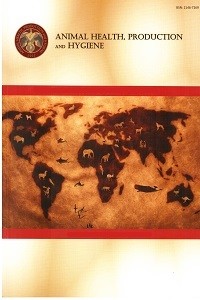Öz
Kaynakça
- Referans1 Broucek, J., Kovalcık, K., & Novak, L. (1990). Evaluation of different types of hutches for calves on the basis of ethological studies. Agriculture (Poľnohospodárstvo), 36 (6), 543-552.
- referans2 Cummins, K.A., & Brunner, C.J. (1991). Effect of calf housing on plasma ascorbate and endocrine and immune function. Journal of Dairy Science, 74 (5), 1582-1588. https://doi.org/10.3168/jds.S0022-0302(91)78320-3
Study on Survival, Serum Immunoglobulin Levels and Some Blood Parameters of Holstein Calves Reared in Individual Calf Hutches
Öz
Calf deaths occur most often from birth to two months of age. Sufficient amount of colostrum consumption, type of barn and hygiene are factors that positively affect the survival of calves. Calves that are fed with a sufficient amount of colostrum to obtain healthy and disease-resistant calves should be taken into the hutches prepared for a single calf. The aim of this study was to determine the effect of the birth season on calves living in individual calf hutches, livability, serum immunoglobulin level and some blood parameters. The material of the study consisted of blood samples of 88 female Holstein calves reared in individual fiberglass calf hutches. Birth season had no effect on calves blood serum total protein and glucose levels (P>0.05), while the age and seasonal factors had significant effect on the immunoglobulin levels and blood parameters (P<0.05). Blood serum IgG levels of calves in the first two months of age were significantly higher in autumn and winter than in spring and summer (P<0.001). Serum IgM levels were found to have higher mean scores in autumn than in other seasons (P<0.001). Serum IgA levels of calves in one-day age were found to be similar in spring and summer seasons, but the difference between all seasons at the other day periods was statistically significant (P<0.001). There was no difference in serum total protein levels between autumn and winter months for each measurement period, whereas it was found to be statistically significantly lower than the other seasons at first day of age (P<0.01). Serum albumin levels were found that the summer season was statistically lower than the other seasons (P<0.001). Serum globulin, urea, glucose levels were found to be statistically significant between seasons. As a result; In addition to the barn structure, it can be said that the seasonal effect is important in terms of providing adequate passive immunity between the births of calves to weaning age. It can be said calves in individual hutches reared in summer and spring months have negative effects on passive immunity transfer in Aydin province and surrounding area. In our study, it was found that calf hutches which are suitable for climatic conditions played an important role in preventing heat stress. It was concluded that the colostrum intake of calves will shed light on the studies investigating the interaction of blood parameters and environmental factors, which are indicative of passive transfer mechanism.
Anahtar Kelimeler
Kaynakça
- Referans1 Broucek, J., Kovalcık, K., & Novak, L. (1990). Evaluation of different types of hutches for calves on the basis of ethological studies. Agriculture (Poľnohospodárstvo), 36 (6), 543-552.
- referans2 Cummins, K.A., & Brunner, C.J. (1991). Effect of calf housing on plasma ascorbate and endocrine and immune function. Journal of Dairy Science, 74 (5), 1582-1588. https://doi.org/10.3168/jds.S0022-0302(91)78320-3
Ayrıntılar
| Birincil Dil | İngilizce |
|---|---|
| Konular | Veteriner Bilimleri |
| Bölüm | Research Article |
| Yazarlar | |
| Yayımlanma Tarihi | 5 Haziran 2020 |
| Gönderilme Tarihi | 24 Aralık 2019 |
| Yayımlandığı Sayı | Yıl 2020 Cilt: 9 Sayı: 1 |


